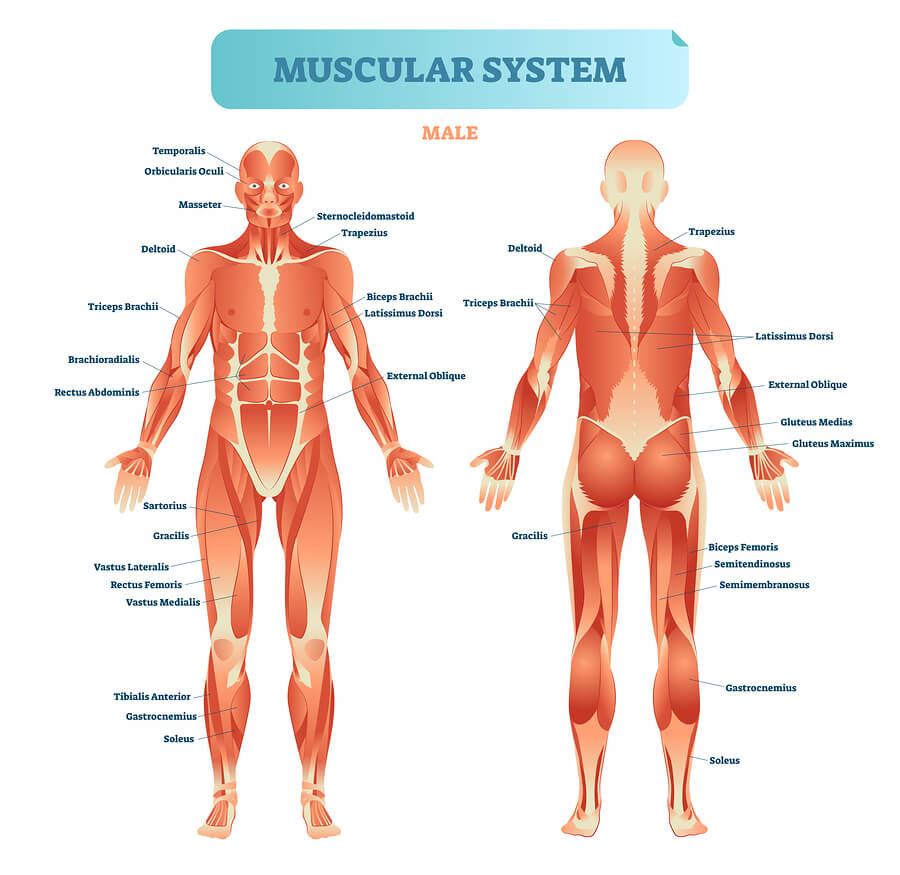Effects & Dangers of Substance Abuse on the Muscular System

What Affects the Muscular System?
Nearly every movement in the body occurs through this system. Damage to this system can lead to issues with movement, damage to other organ systems, and chronic pain.
None of the organ systems in the body operate independently. For instance, because the musculoskeletal system is primarily controlled by the central nervous system except for a few reflexive actions, damage to the central nervous system can also result to damage to the musculoskeletal system. Certain drugs, like powerful stimulant drugs such as cocaine and methamphetamine, and other drugs like ecstasy, spice, and inhalants, can damage important areas in the brain, the major organ in the central nervous system, and this damage can lead to movement problems. Over time, these problems can result in muscle atrophy or damage to the musculoskeletal system.
Damage inflicted by alcohol and drugs to the brain can lead to:
- Issues with movement: Problems with movement (ataxia) can occur that can impair voluntary movements. This can lead to accidents that can damage the musculoskeletal system.
- Issues with seizures: Chronic use of these drugs can lead to seizures that can damage the muscles through violent controllable movements.
- Problems with judgment: Chronic use of drugs impairs judgment and motor coordination, which can lead to accidents that can result in damage to the muscles.
- Cardiovascular compromise: Chronic use of these drugs can compromise the vascular system in the brain, leading to increased risk for stroke, which can lead to paralysis, weakness, or even a loss of function in one or more limbs. This can lead to atrophy in the muscles.
A stroke or cerebrovascular accident (CVA) results when there is a compromise in the flow of blood to areas of the brain, or the blood vessels actually rupture in the brain. This deprives that area of the brain of oxygen and nutrients, leading to tissue damage. Numerous drugs of abuse, including alcohol, stimulants like cocaine and methamphetamine, and opiate drugs, can increase the risk for stroke.
When the brain is damaged, it may repair itself to some extent, but the damage may not be fully repaired. In cases where there is significant muscle weakness, loss of movement, or paralysis as a result of a stroke, the muscles in that area may become atrophied.
Moreover, numerous drugs of abuse can place a significant burden on the heart. Many drugs of abuse, including stimulant drugs, opiates, alcohol, and other illicit drugs, can result in deterioration of the heart muscle (cardiomyopathy), high blood pressure, and heartbeat irregularities (arrhythmias). These conditions can become serious and increase the risk of serious heart disease, including a heart attack.
The risk of suffering a CVA is also increased in individuals who have cardiovascular diseases. For instance, high blood pressure forces the heart muscle to work harder and faster, and over time, this can result in a weakening of the arteries, leading to an increased potential for stroke.
The musculoskeletal system is supported by the skeletal system. Chronic use of various drugs, including alcohol, stimulants, opiates, and other illicit drugs, can compromise the skeletal system and lead to the development of infections in the bone (osteomyelitis), arthritis, and even osteoporosis (weakening of the bones due to the loss of calcium or decreased bone density).
Dietary imbalances can occur, as in many cases, chronic drug abusers neglect their diet, or these imbalances can occur as a direct result of the effects of the drugs (e.g., alcohol), interfering with the person’s ability to absorb nutrients. This can lead to imbalances in the system that can affect the muscular system at all levels.
How Specific Drugs Affect the Muscular System
- Central nervous system depressant drugs: Central nervous system depressants slow down the functioning of the neurons in the brain and spinal cord. Several major central nervous system depressants can affect the muscular system in numerous ways.
- Alcohol can directly alter digestive processes, particularly the absorption of nutrients like calcium, which can lead to an increased risk for bone diseases. The process of metabolizing alcohol in the body creates a toxic substance (acetaldehyde), which can increase the risk for numerous forms of cancer. Chronic alcohol use can lead to many conditions that can affect the muscles, such as rhabdomyolysis where muscle tissue breaks down and releases toxins in the bloodstream. This can eventually result in kidney failure and compromise the entire muscular system. Chronic alcohol use can compromise the brain, particularly areas in the anterior portion, the right hemisphere of the brain, and the cerebellum, which can lead to brain damage that can directly affect the functioning of muscles as explained above.
- Opiate drugs like heroin, Vicodin (acetaminophen and hydrocodone), OxyContin (oxycodone), and others are central nervous system depressants that are most often used to relieve pain. Abuse of these drugs can actually result in an increase in muscle aches and pain, particularly during the withdrawal process. Intravenous use of opiate drugs can compromise the cardiovascular system and lead to infections, including infections of the joints and tendons. Serious blood-borne diseases that can be acquired through needle sharing, such as HIV and hepatitis, can eventually result in significant compromise to the muscular system due to the direct effects of the disease itself, malnutrition, and muscle atrophy.
- Benzodiazepines are central nervous system depressants that are primarily used in the treatment of clinical anxiety and for the treatment of seizures. These include drugs like Valium (diazepam), Xanax (alprazolam), and many others. Chronic abuse of these drugs can affect certain areas of the brain, which can lead to problems with movement, emotional control, and memory. Intoxication due to benzodiazepines can lead to problems with coordination, muscle weakness, and poor judgment that can lead to accidents that compromise the musculoskeletal system.
- Central nervous system stimulants: Abuse of central nervous system stimulants can affect the heart (cardiac muscle) and compromise the functioning of the cardiovascular system. This can lead to significant damage to the muscular system. Chronic use of powerful stimulants like methamphetamine and cocaine may produce brain damage, which can further compromise the musculoskeletal system.
- Inhalants: Inhalants are typically items that are used around the house, such as aerosols, spray paints, markers, and cleaners. Individuals inhale the fumes of the substances in order to achieve their psychoactive effects. Chronic use of inhalants can result in brain damage, which can lead to compromise in the muscular system as well as damage to bones (e.g., the use of benzene). Moreover, these substances may produce severe psychosis, which can increase the risk that a person will act impulsively or exercise poor judgment and injure themselves.
- Designer drugs: Designer drugs are privately manufactured and designed specifically to produce psychoactive effects (getting high). They include Spice and various analogues of cannabis, LSD, and other drugs. These drugs are designed to mimic the chemical structure of certain controlled substances, but initially may not qualify as controlled substances themselves. Because these drugs are not tested under laboratory conditions, not manufactured under professional quality control conditions, and distributed illicitly, numerous problems can occur that can include an increased risk for brain damage, an increased risk for stroke or heart damage, and an increased risk for other detrimental effects that can affect the muscular system.
- Anabolic steroids: Although anabolic steroids are designed to help build muscular tissue in individuals who suffer from severe malnutrition or diseases that result in atrophy or a loss of appetite, when these substances are abused by athletes, bodybuilders, and others, they can alter muscle growth, lead to muscle tears and ruptures, and lead to infections in the muscles and bones that can compromise the muscular system. Chronic use of these substances may damage the central nervous system and the cardiovascular system, increasing the risk for further damage in numerous organ systems.
Every System Is Affected by Drug Use

As mentioned above, no organ system operates in isolation. Any substance that can damage one organ system can also lead to serious damaging effects on other organ systems. For instance, the development of rotting teeth and skin abscesses as a result of methamphetamine abuse can lead to diseases that can compromise the muscular system, heart, liver, kidneys, and central nervous system.
Addiction affects the entire organism, and this is why the treatment for substance use disorders needs to be comprehensive, long-term, and include interventions from multiple areas. The damage that is inflicted by addictive behaviors may or may not fully resolve, depending on numerous situational issues.
When the damage from a person’s substance use disorder becomes severe, especially to the central nervous system, the skeletal system, the liver, and the heart, these organ systems may not fully recover. Damage to any system results in significant compromises to the muscular system over the long run.
